Obsessed with “Ripley”? Watch These Other Movies About the Irresistible Villain — and See Which Is Best!
Matt Dillon, John Malkovich and Dennis Hopper have each put his own special spin on the talented Patricia Highsmith psychopath
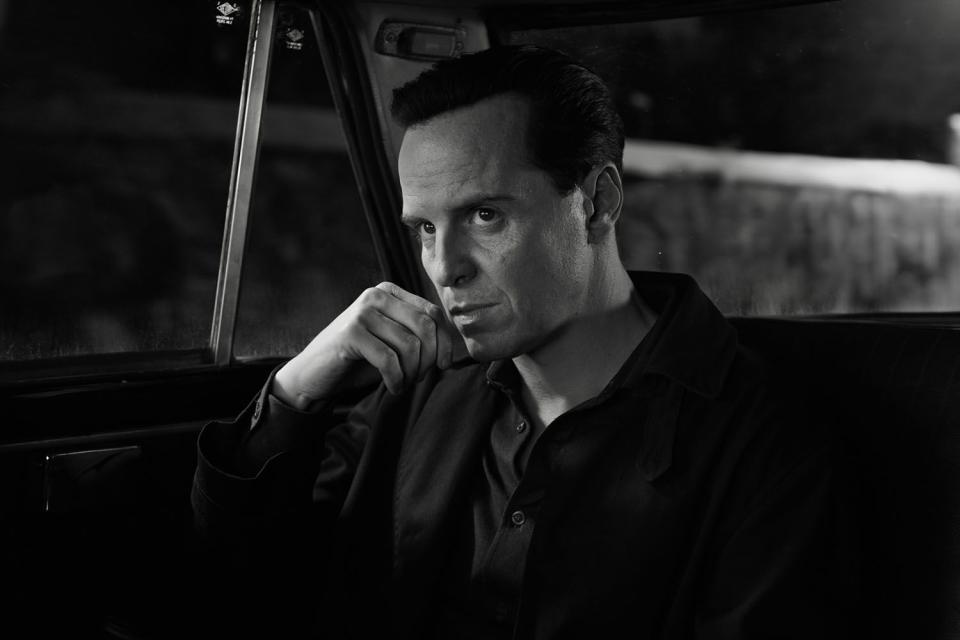
Netflix
Andrew Scott in Netflix's 'Ripley'Netflix’s buzzy new hit Ripley will have you hooked on a deliciously confusing sensation. You watch in horror as a psychopath—feral and sly and cold—bludgeons his victims to death. Then you anxiously root for him to evade the police and get clean away, time after time. If Hannibal Lecter or Norman Bates were watching, they might feel the same way.
That pull between repulsion and identification can only mean one thing: that this eight-episode series has sucked you into the sinister, weird and fundamentally inscrutable world of novelist Patricia Highsmith (1921-1995), whose greatest creation—the ruthless killer Tom Ripley—is played to mean, pinched perfection by Fleabag’s Andrew Scott.
Based on Highsmith's The Talented Mr. Ripley, first published in 1955, Ripley is about a murderous American opportunist on the make in Italy, where he attaches himself in a parasitic, possibly homosexual fashion to a rich fellow expat, Dickie Greenleaf (Johnny Flynn). Unfortunately, what's good for Tom turns out to be very bad for Dickie—and yet Dickie, who's well-meaning if not terribly intelligent, is somehow less sympathetic than Tom.
This is part of Highsmith's brilliance: She's a master at putting abnormal, even aberrant psychology at the dead center of a narrative, so that a perspective that might seem warped, illogical or incomprehensible to a reader (or viewer) instead advances along a straight, undeviating line.
Never miss a story — sign up for PEOPLE's free daily newsletter to stay up-to-date on the best of what PEOPLE has to offer , from celebrity news to compelling human interest stories.
"I often had the feeling Ripley was writing [the book]," Highsmith would recall in 1966, "and I was merely typing.”
Netflix's version, shot in grimly lustrous black and white, is close to flawless at capturing the original novel's sense of fascinated dread and enigmatic attraction, but Highsmith’s anti-hero has been well served by other adaptations that play on different tensions and angles.
On the page, Tom Ripley isn't an ambiguous character—not at all. On the screen, however, where he can be played by a range of magnetic (and clever) actors, he turns out to be an intriguingly versatile monster.
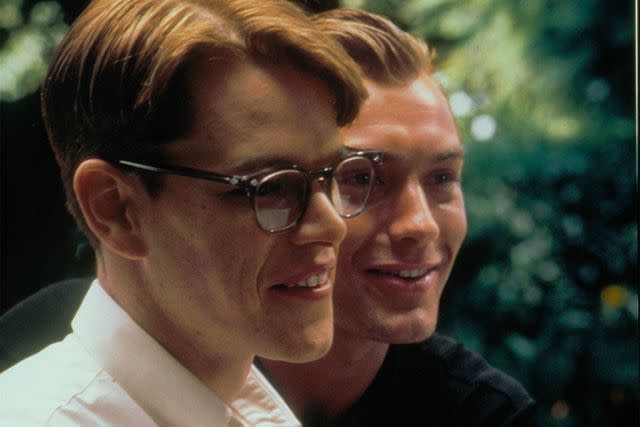
Moviestore/Shutterstock
Matt Damon and Jude Law in 'The Talented Mr. Ripley'The Talented Mr. Ripley (1999)
Director Anthony Minghella’s film is possibly the most entertaining and thoughtful adaptation of the novel. Matt Damon is a sympathetic young Ripley, inching his way onto the beach at Amalfi in a ludicrous little pair of chartreuse swim trunks; Jude Law (Oscar-nominated) makes a dazzlingly attractive Dickie, so gleaming and golden he might have been bathing in clarified butter; and Gwyneth Paltrow ratchets up film’s the suspense as Dickie's lover, Marge, slowly growing terrified as she begins to comprehend Ripley's character. (Cate Blanchett, in the small role of a gawky socialite, also figures in a decisive twist.)
But Minghella overplays the gay subtext, and ends up linking toxic homophobia with serial homicide: The film suggests that Ripley becomes a killer because society won’t allow him to live outside the closet. Highsmith, in fact, said that she didn’t think Ripley was gay, pointing out that in subsequent books—there are five in all—he’s married to a Frenchwoman. (In those novels, though, he seems to have become hardened against any sexual feeling at all.)
But Highsmith, who was herself gay, certainly threaded the original novel with homosexual tension, and she was fascinated by queer culture. “The homosexual," she wrote in her diaries, "is a higher type of man than other men. ” True!
Anyway, this film is the one to watch when you’re done with Netflix's Ripley.
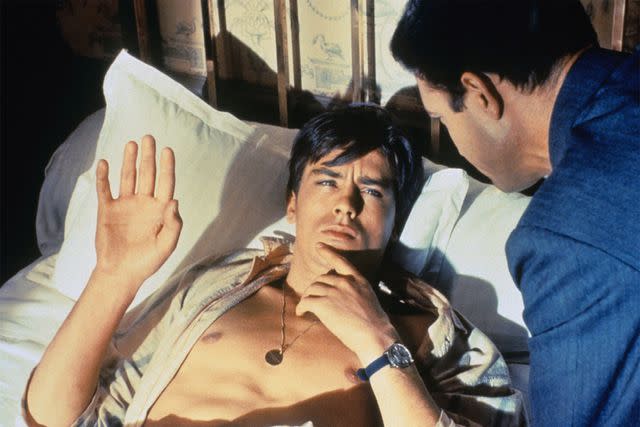
Everett
Alain Delon in 'Purple Noon'Purple Noon / Plein Soleil (1960)
Directed by René Clément with a fine appreciation for the mordant humor implicit in The Talented Mr. Ripleys's ever-tightening noose of deceit and coincidence, Noon is probably the most sensual of any Highsmith adaptation.
The film is practically intoxicated by the Italian light and air, the blue skies and water and its Ripley is played by French star Alain Delon at his youthful peak: He’s so slender and handsome, with his exquisitely shaped nose and the smile of a fox seducing a row of hens, you can’t object too much if he decides to kill a few people.
(How did French cinema manage to produce two stars as gorgeous as Delon and Catherine Deneuve in the same generation?) Highsmith liked Delon's performance quite a lot but wasn’t crazy about the film’s tidy wrap-up.
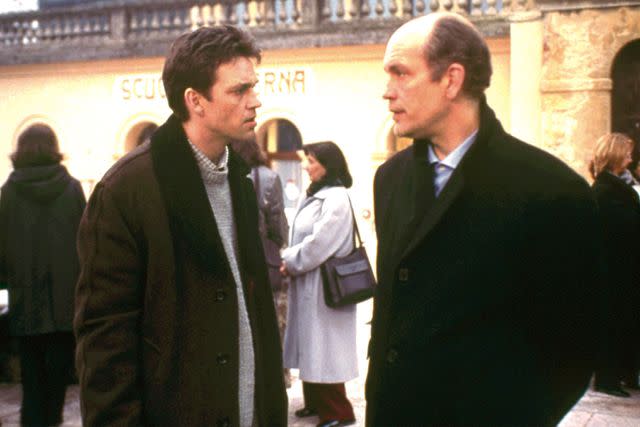
Everett
Dougray Scott, left, and John Malkovich in 'Ripley's Game'Ripley's Game ( 2002)
Based on the third Ripley novel—the second one to feature the "mature" killer—Game stars John Malkovich, whose air of amused perversity and cold, condescending sophistication make him close to ideal in the role. This Ripley, who lives the high life on an Italian estate with a harpsichordist wife, is offended when a local art framer named Jonathan (Dougray Scott) insults him as being an American arriviste with bad taste.
In an odd but singularly cruel act of revenge, Ripley proposes to a mobster acquaintance (Ray Winstone) that he hire Jonathan to do a hit job in Berlin. Jonathan is dying of leukemia, after all, and probably needs the money. Poor Jonathan is soon in over his head, assigned to carry out a garroting execution in an express-train lavatory. This is a long, enjoyably gruesome sequence, with Ripley unexpectedly lending a hand and telling Jonathan: "Keep my watch, 'cause if it breaks, I'll kill everyone on this train."
The American Friend (1977)
One of the best films to come out of the movement known as the New German Cinema, Friend is another adaptation of Ripley’s Game. It's set largely in Hamburg, with a cowboy-hatted Dennis Hopper as a Ripley who sounds like a Beat Poet and Bruno Ganz (with his sad, romantic mustache) as the reluctant hitman.
Directed by Wim Wenders, Friend has a political edge that emphasizes Ripley’s American otherness—and his danger: He’s a corrosively powerful force promising prosperity and friendship but delivering death instead. Well, you’re free to ponder that interpretation—or not, because it's more likely you'll be swept along by the suspense. Highsmith, perhaps not surprisingly, wasn’t wild about Hopper’s hipster-devil performance.
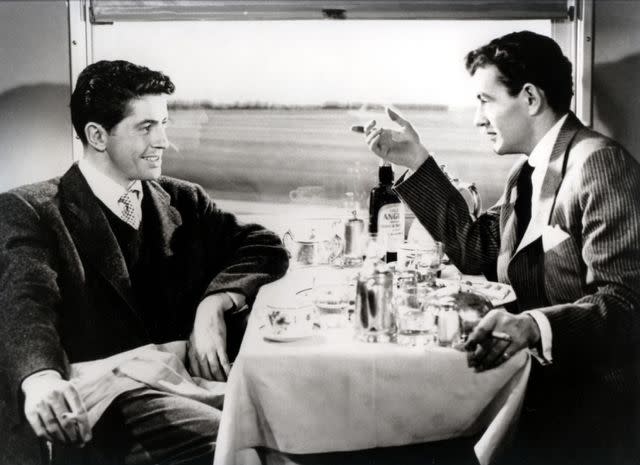
Strangers on a Train (1951)
This Alfred Hitchcock masterpiece isn’t a Ripley film, but it’s a classic exercise in Ripleyan themes—identity obsession/appropriation, homoeroticism and violence as the irrational yet tactical solution to what might otherwise be insurmountable obstacles. Robert Walker is the silken but psychotic Bruno, who suggests to tennis player Guy (Farley Granger) that they swap murders—Bruno will kill Guy’s troublesome ex-lover, and Guy will kill Bruno’s rich, hostile father.
A closing note: Highsmith doesn't seem to have been over the moon about any of the Ripley adaptations that were released in her lifetime, but she also accepted that she had no control over directors, stars or studios. Her own personal favorite film was Gone With the Wind, starring Vivien Leigh as the Talented Scarlett O’Hara.
For more People news, make sure to sign up for our newsletter!
Read the original article on People.